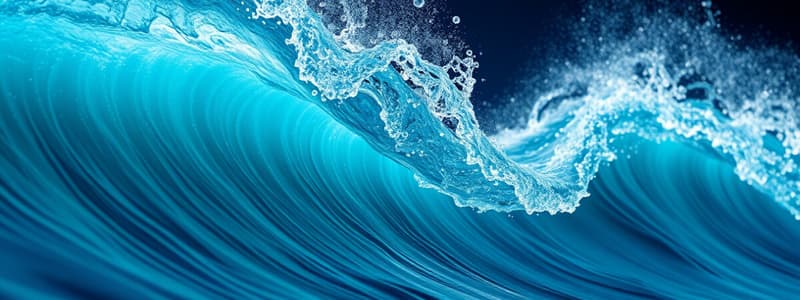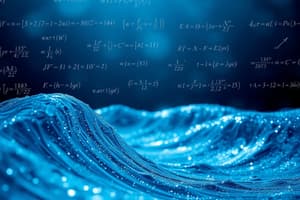Podcast
Questions and Answers
What is a medium?
What is a medium?
- The distance from crest to crest
- The matter through which a wave travels (correct)
- The time required for one complete vibration
- The bouncing back of a wave
What are mechanical waves?
What are mechanical waves?
Waves that require a medium
What do electromagnetic waves consist of?
What do electromagnetic waves consist of?
Changing electric and magnetic fields in space
What are transverse waves?
What are transverse waves?
What are longitudinal waves?
What are longitudinal waves?
What are crests in a wave?
What are crests in a wave?
What are troughs in a wave?
What are troughs in a wave?
What is amplitude?
What is amplitude?
What is wavelength?
What is wavelength?
What is a period in wave motion?
What is a period in wave motion?
What is frequency?
What is frequency?
What is the Doppler effect?
What is the Doppler effect?
What is reflection in wave motion?
What is reflection in wave motion?
What is diffraction?
What is diffraction?
What is refraction?
What is refraction?
What is interference?
What is interference?
What is constructive interference?
What is constructive interference?
What is destructive interference?
What is destructive interference?
What is a standing wave?
What is a standing wave?
Study Notes
Wave Concepts
- Medium: The substance through which waves travel, essential for mechanical waves.
- Mechanical Waves: Require a medium to propagate; examples include sound waves and water waves.
- Electromagnetic Waves: Comprise varying electric and magnetic fields and can travel through a vacuum.
Types of Waves
- Transverse Waves: Characterized by particle motion that is perpendicular to the wave's direction. Examples include waves on strings or water surfaces.
- Longitudinal Waves: Feature particle motion that is parallel to the direction of wave propagation; sound waves are a prime example.
Wave Characteristics
- Crest: The highest point on a transverse wave, indicating maximum energy.
- Trough: The lowest point on a transverse wave, demonstrating the wave's minimum energy state.
- Amplitude: Represents the maximum displacement of particles from their resting positions, indicative of wave energy.
- Wavelength: The measurement between successive crests or troughs, crucial for wave identification and properties.
- Period: The time it takes for one complete cycle of vibration in a medium; related to frequency and wavelength.
- Frequency: The count of wavelengths that pass a fixed point over a designated time period; higher frequency indicates more energy.
Wave Behavior
- Doppler Effect: Observed frequency changes when the source of waves moves relative to an observer, affecting sound and light waves.
- Reflection: When waves encounter a surface and bounce back, important for various applications like sonar and optics.
- Diffraction: Waves bend around obstacles and spread out after passing through narrow openings, influencing wave behavior in different environments.
- Refraction: The bending of waves as they move from one medium to another, altering speed and direction.
Interference Patterns
- Interference: Occurs when multiple waves overlap in the same space, creating resultant wave patterns.
- Constructive Interference: Results when waves combine, amplifying the resultant wave's amplitude; occurs when crests align.
- Destructive Interference: Occurs when a crest meets a trough of another wave, diminishing overall amplitude and energy.
Standing Waves
- Standing Wave: A wave pattern formed by the interference of two waves traveling in opposite directions, resulting in fixed nodes and antinodes.
Studying That Suits You
Use AI to generate personalized quizzes and flashcards to suit your learning preferences.
Description
Test your understanding of key science vocabulary related to wave mechanics. This quiz covers definitions and concepts like medium, mechanical waves, and electromagnetic waves. Perfect for students looking to strengthen their grasp on physics terminology.




